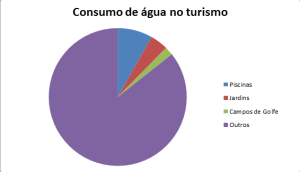Climate Detectives Projects 2022-2023
Project title: Saving water in tourism
Team: Internacionais da água
EBS Bemposta Portimão Portugal 6 Student’s age: 14-15 years old, 16-17 years old
Is there excessive use of water in tourism?
Existe uso excessivo de água no turismo?
We have researched the drought in Portugal and compared over the years, various solutions to reduce water use in tourism (e.g. gardens, golf courses, swimming pools) and investigated measures to save water mainly in the tourism industry, where the waste of water is much higher than average and where it is urgent to raise awareness among economic operators and the community to save water in swimming pools, gardens, golf courses and tourism-related activities.
Nós pesquisamos sobre a seca em Portugal e comparamos ao longo dos anos, sobre várias soluções para reduzir a água no turismo (ex. Jardins, Campos de Golfe, Piscinas) e investigamos medidas para poupar a agua principalmente na indústria do turismo, onde o desperdício de água é muito superior à média pelo que é urgente sensibilizar os operadores económicos e a comunidade para poupar água nas piscinas, nos jardins e nos campos de golfe e nas atividades ligadas ao turismo.

To change this, we could study the examples of countries like Israel and Spain that use the desalination process and use this water for swimming pools and irrigation of golf courses and gardens. In the pools by the sea we can also use mechanisms that pull the sea water to fill the pools (e.g. Pestana Delfim Hotel).
O turismo em Portugal, usa maioritariamente agua potável para encher piscinas, regar os campos de golfe e jardins, para mudar isto poderíamos estudar os exemplos de países como Israel e Espanha que são países que usam o processo de dessalinização e usar essa água para as piscinas e rega dos campos de golfe e jardins. Nas piscinas junto ao mar também podemos usar mecanismos que puxam a agua do mar para encher as piscinas.(Ex: Hotel Pestana Delfim)
1) Take advantage of rainwater:
We know it doesn’t rain much, but there are always some periods with good rainfall and this is a good way to get some free water.
2) Create a garden that does not need to have a lot of water:
Indigenous plants that do not need much watering, natural grass with low water consumption or, if you prefer, artificial grass, a comfortable alternative that does not need water.
3) Choose an efficient irrigation system:
You can opt for an underground irrigation system, or a drip solution if you have trees and other plants, or an exudation system – a type of continuous watering – if you have a vegetable garden.
4) Clean your outdoor space with high pressure washers:
High pressure washers are more efficient for washing various types of flooring, from ceramic to stone, to swimming pools or even facades. Because they use pressure, these machines have the ability to clean surfaces more easily, allowing you to use up to 70% less water compared to hoses.
1) Aproveite a água da chuva:
Sabemos que não chove muito, mas há sempre alguns períodos com boa precipitação e esta é uma boa maneira de arranjar alguma água gratuita.
2) Crie um jardim que não necessite de ter muita água:
Plantas autóctones que não precisem de muita rega, relva natural de baixo consumo hídrico ou, se preferir, relva artificial, uma alternativa cómoda e que não precisa de água.
3) Escolha um sistema de rega eficiente:
Pode optar por um sistema de rega enterrada, ou por uma solução gota a gota caso tenha árvores e outras plantas, ou por um sistema de exsudação — um tipo de rega contínua —, caso tenha uma horta.
4) Limpe o seu espaço exterior com lavadoras de alta pressão:
As lavadoras de alta pressão são mais eficientes para lavar vários tipos de pavimento, desde cerâmica a pedra, até piscinas ou mesmo fachadas. Por utilizarem pressão, estas máquinas têm a capacidade de limpar mais facilmente as superfícies, permitindo gastar até menos 70% de água em relação às mangueiras.
https://sites.google.com/aebemposta.com/internacionaisdagua/p%C3%A1gina-inicial
This project was automatically translated into English.
Projects are created by the teams and they take the full responsibility of the shared data.
← All projects



